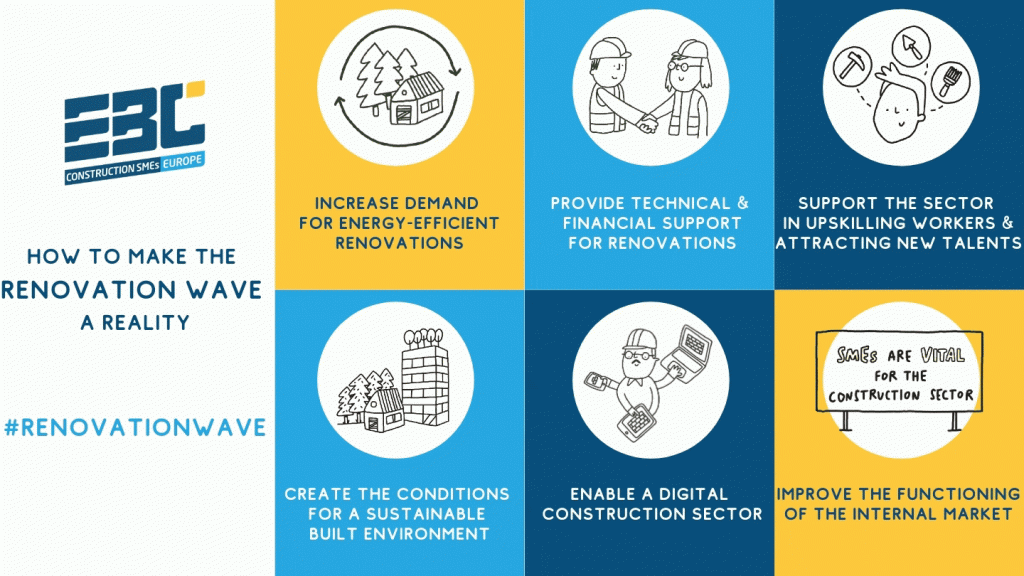
Renovation wave: Only a stable and enabling policy framework will stimulate demand
February 16, 2021
EBC considers the European Commission’s strategy on “A Renovation Wave for Europe – greening our buildings, creating jobs, improving lives”, as an important step to better align building-related policies but remains concerned about the possibility of a resulting regulatory framework marked by constant change.
The Renovation Wave strategy highlights the importance of energy efficiency renovations to reach the 55% emission reduction target of the European Union and the possibilities that investment in buildings can offer for occupants and the construction sector. In addition to this, it aims at improving the sustainability of the built environment by interlinking policy measures on issues such as energy efficiency, resource efficiency and digitalisation, thus crucially contributing to the implementation of the European Green Deal in the construction sector. For this reason, EBC welcomes the Renovation Wave strategy as an important step to overcome the silos in which building-related aspects were often viewed before, and as a promising tool to further stimulate demand for construction activities.
However, EBC wants to emphasise that the uncertainties arising from a constantly changing policy framework may hamper rather than stimulate renovation, in particular when implementation at the national level lags behind. Furthermore, it needs to be ensured that possible stricter legislative requirements consider the capacities of construction SMEs and craftsmen, to guarantee they are neither left behind nor excluded from the market. Based upon this, EBC calls for the following:
- Ensure proportionate mandatory minimum energy performance requirements, which are gradually introduced through a pre-defined long-term path and flanked by earmarked financial support and funding for property owners.
- Extend the existing building renovation target of 3% for publicly owned buildings to all levels of public administration.
- Guarantee the availability of public funding and financing for the renovation of the built environment through a stringent application of rules when approving financial means under the Multiannual Financial Framework and the NextGenerationEU
- Improve the functioning and uptake of one-stop-shops delivering tailored renovation advice, by addressing challenges related to processes, expectations and capacity.
- Improve information, access and adequate funding for the upskilling of workers in the construction sector, with particular attention to SMEs.
- Ensure that an appropriate number of recycling and collection centres or grouping/storage platforms located close to construction businesses or worksites are in place before further strengthening material recovery targets for construction and demolition waste.
- Provide financial support through subsidies or tax credits to facilitate the purchase and use of recycled materials as well as reused and sustainable products in the EU, while ensuring the maintenance of a level playing field.
- Make the digital transformation of the built environment and the construction sector a priority in European funding programs and put special attention to the inclusion of SMEs to enable all enterprises, independent of their size, to participate.
“The Renovation Wave strategy offers the possibility to ensure high-quality, sustainable and digital renovations by providing a comprehensive approach towards building-related policies. However, we need to ensure that financial incentives and support are available for property owners to boost renovations, and refrain from discouraging their investments through constant regulatory changes,” stresses Eugenio Quintieri, EBC Secretary-General. “Another equally important aspect is financial and technical support for the transformation of construction SMEs and craftsmen because they are essential to make the renovation wave a reality.”
